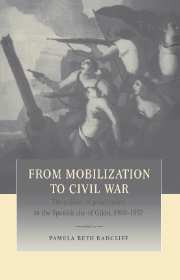Book contents
- Frontmatter
- Contents
- List of maps
- List of tables
- Acknowledgments
- Glossary of terms and abbreviations
- Introduction
- 1 A turning point: the city in 1900
- PART I Patterns of life in working-class Gijón
- PART II Institutional forces of opposition: republicans and anarchosyndicalists
- PART III Defining an oppositional culture: the struggle over the public sphere
- PART IV The urban battlefield: conflict and collective action, 1901–1936
- 9 Conflict and collective action, 1901–1930
- 10 Conflict and collective action during the Republic, 1931–1936
- Conclusion
- Appendix 1 Wage and price movement
- Appendix 2 Occupations by status category
- Appendix 3 Supplementary tables
- Select bibliography
- Index
9 - Conflict and collective action, 1901–1930
Published online by Cambridge University Press: 31 October 2009
- Frontmatter
- Contents
- List of maps
- List of tables
- Acknowledgments
- Glossary of terms and abbreviations
- Introduction
- 1 A turning point: the city in 1900
- PART I Patterns of life in working-class Gijón
- PART II Institutional forces of opposition: republicans and anarchosyndicalists
- PART III Defining an oppositional culture: the struggle over the public sphere
- PART IV The urban battlefield: conflict and collective action, 1901–1936
- 9 Conflict and collective action, 1901–1930
- 10 Conflict and collective action during the Republic, 1931–1936
- Conclusion
- Appendix 1 Wage and price movement
- Appendix 2 Occupations by status category
- Appendix 3 Supplementary tables
- Select bibliography
- Index
Summary
Social conflicts in Asturias go on forever.
Editorial, El Noroeste, September 12, 1919In December of 1900, the dockworkers' union, La Cantábrica, took the initial step in what would snowball into Gijón's first general strike. The three-hundred-member union, which included all of the city's dockworkers, demanded that their employers adopt the eight-hour day and agree to hire only from union ranks. Through their organization, the Agremiación Patronal (AP), the employers not only rejected the terms, but they refused to negotiate with the union. In response, La Cantábrica struck on January 15th, while the AP counter-attacked by importing scab workers from Castille to replace them.
Under this challenge to the principle of unionization, the rest of the 6,000-member local federation joined in the struggle by voting to launch a general strike in support of the dockworkers. In retaliation, the employers fired back with a lock-out. Two sets of government mediators could not get the two sides to budge, and the strike/ lock-out dragged on until the first week of March, when the intransigence of the employers, internal divisions between Socialists and anarchists and the exhaustion of their resources forced the strikers to capitulate.
The terms of the armistice were harsh for the unions, which lost most of the gains they had made in the previous several years. The AP demanded a return to nine- and ten-hour work days, no salary increases, and the freedom to hire and fire at will. The ultimate humiliation was that La Cantábrica had to accept the permanent employment of the scab crew that had crossed picket lines.
- Type
- Chapter
- Information
- From Mobilization to Civil WarThe Politics of Polarization in the Spanish City of Gijón, 1900–1937, pp. 253 - 279Publisher: Cambridge University PressPrint publication year: 1997



